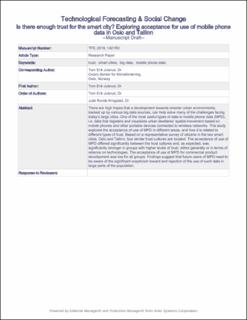Is there enough trust for the smart city? exploring acceptance for use of mobile phone data in oslo and tallinn
Journal article, Peer reviewed
Accepted version
Permanent lenke
https://hdl.handle.net/11250/2761611Utgivelsesdato
2020Metadata
Vis full innførselSamlinger
- Journal articles [478]
Originalversjon
Technological Forecasting and Social Change. 2020, 161 (December), . 10.1016/j.techfore.2020.120314Sammendrag
There are high hopes that a development towards smarter urban environments, backed up by various big data sources, can help solve many of the challenges facing today's large cities related to providing security, mitigating environmental damages, improving services and upscaling innovative and entrepreneurial activities. This study explores the acceptance of use of mobile phone data (MPD) in different areas, and how it is related to different types of trust. Based on a representative survey of citizens in the two smart cities, Oslo and Tallinn, four similar trust cultures are located. The acceptance of use of MPD differed significantly between the trust cultures and, as expected, was significantly stronger in groups with higher levels of trust, either generally or in terms of reliance on technologies. The acceptance of use of MPD for commercial product development was low for all groups. Findings suggest that future users of MPD need to be aware of the significant scepticism toward and rejection of the use of such data in large parts of the population. Unless visions of the smart city are grounded in the needs and wants of citizens, such plans are not likely to succeed, and negative understandings and images of a panoptic state may take stronger hold. As for now, however, there seems to be insufficient social trust to exploit this on a wider scale without creating even more scepticism and distrust.

